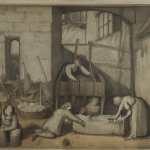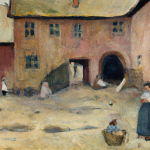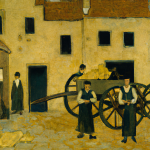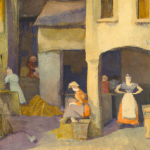The Emperor Is Tired
Discover the world of power and arbitrariness with “The Emperor Is Tired”, an instrumental track on Muax’s album “The Dictator Is Coming”. The song’s edgy and restless atmosphere reflects the tense situation of the people living under the rule of a capricious and unpredictable emperor.
The trumpet as the solo instrument plays short, sharp notes that serve as a warning to the people. The keyboard line accentuates this mood with a menacing melody, creating a sense of fear and insecurity.
The title of the song, “The Emperor Is Tired”, is ambiguous. On the one hand, it can be taken as a literal description of the emperor’s state of being. On the other hand, it can also be interpreted as a metaphor for the weariness of the people who are exhausted by the constant tension and pressure of imperial rule.
Musical elements such as the hectic trumpet, the dissonant harmonies and the driving rhythm contribute to creating an atmosphere of fear and distrust. The piece leaves room for speculation about the potential consequences of the emperor’s whims and invites reflection on the impact of power abuse on society.
#TheEmperorIsTired #TheDictatorIsComing #NewMusic #Power #Arbitrariness #Capricious #Unpredictable #Trumpet #Instrumental #ThoughtProvoking #Fear #Insecurity #Society #PowerAbuse #Muax #Muaxmusic
The Emperor Is Tired
Das Instrumentalstück “The Emperor Is Tired” auf dem Album “The Dictator Is Coming” von Muax zeichnet eine Welt der Macht und der Willkür. Die aufgekratzte und gereizte Atmosphäre des Songs spiegelt die angespannte Situation des Volkes wider, das unter der Herrschaft eines launischen und unberechenbaren Kaisers lebt.
Die Trompete als Soloinstrument spielt kurze, grelle Töne, die wie ein Weckruf an das Volk wirken. Die Keyboardlinie untermalt diese Stimmung mit einer bedrohlichen Melodie, die ein Gefühl von Angst und Unsicherheit erzeugt.
Der Titel des Songs “The Emperor Is Tired” ist mehrdeutig. Einerseits kann er als wörtliche Beschreibung des Zustands des Kaisers verstanden werden. Andererseits kann er aber auch als Metapher für die Müdigkeit des Volkes interpretiert werden, das von der ständigen Anspannung und dem Druck der kaiserlichen Herrschaft erschöpft ist.
Musikalische Elemente wie die hektische Trompete, die dissonanten Harmonien und der treibende Rhythmus tragen zur Erzeugung einer Atmosphäre der Angst und des Misstrauens bei. Das Stück lässt Raum für Spekulationen über die möglichen Folgen der kaiserlichen Launen und lädt zum Nachdenken über die Auswirkungen von Machtmissbrauch auf die Gesellschaft ein.




